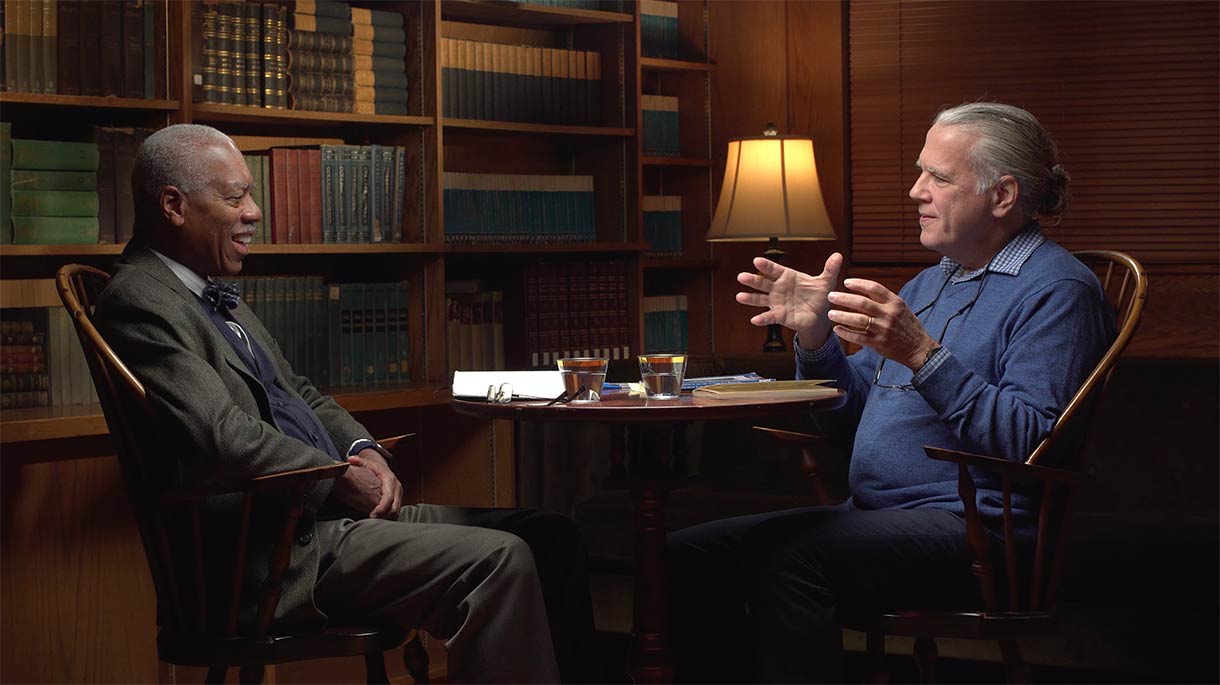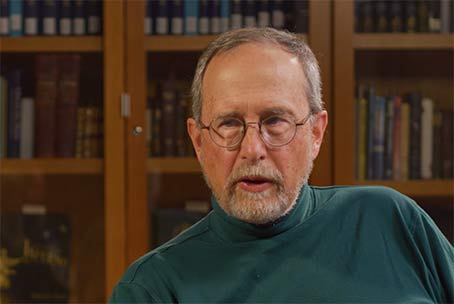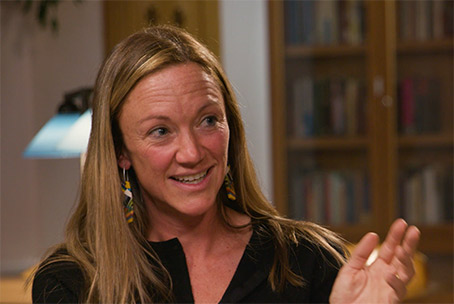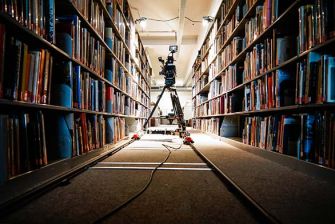
Listen to the Podcast
Prefer to listen to Continuing the Conversation? Subscribe on your favorite podcast platform via the links below.
Sarah Davis + Grant Franks
Is it important to feel when we read literature? Or when we learn math and science? On a related front, what is the role of order and disruption in literature, in life, and in our observation of the universe? In this episode, Santa Fe host Sarah Davis and tutor Grant Franks explore the meaning and value of feeling, then launch into a wide-ranging conversation about the ways in which emotion, order, chaos, and discovery seem central to great literature, to world-changing shifts in math and science, and to one’s own sense of self and belonging. Through dramatic moments and characters in the Iliad, the Aeneid, and The Brothers Karamazov to Newton’s Principia Mathematica and Nietzsche’s Beyond Good and Evil, this episode investigates what makes us feel and how to feel about deep feeling.

Grant Franks (A77) is a tutor at St. John’s College. This semester, he is pondering Joyce in sophomore seminar and discussing Darwin in senior laboratory.

Sarah Davis is a tutor at St. John’s College. This semester, she is discussing Aristotle in freshman seminar and Dedekind’s theory of numbers in junior mathematics.

Prefer to listen to Continuing the Conversation? Subscribe on your favorite podcast platform via the links below.
The power and beauty of Homer’s imagery in the Iliad is undeniable, and his scenes of battle often prompt vexing questions about ancient and modern virtues. Can killing and dying in war be beautiful? Is a just cause required for glory to be gained? Is war a courageous way of fulfilling human nature and, ultimately, of embracing the reality that death awaits us all? This episode, in which Annapolis host Louis Petrich and tutor Erica Beall delve into the dramatic contrasts that make Homer’s work powerful and war potentially beautiful, invites us to question our own modern perspectives on this ancient text.
Louis Petrich + Michael Grenke The Limitations & Possibilities of Sight: Euclid’s Optics
What are the limitations and possibilities of perception—and what do the ancient mathematics of Euclid’s Optics and the modern literature of Proust have to say about this question?
Krishnan Venkatesh + Aparna Ravilochan Family Drama: From Oedipus to Ozu
Family is an inexhaustible source of conflict for dramatists, novelists, and filmmakers—perhaps more inexhaustible than war. From Greek dramatists Aeschylus and Sophocles to Confucius, Vyasa, and Ozu, family is a problem, a question, and a source of both self-destruction and self-actualization.
Sarah Davis + Patricia Greer The Ideal Community: The Adventure to Try
Can an ideal human community ever be achieved? Socrates believed such a community would only be possible if and when humans develop an “erotic zeal for philosophy.” Santa Fe tutor Patricia Greer, a founding pioneer of the intentional ecovillage of Auroville, India, discusses the tension between philosophical ideals that exist in both Eastern and Western philosophy and the political realities that arise when humans attempt to realize them together.
Louis Petrich + Jonathan Badger Pursuing the Eternal Present
Does a contemplative life bring us closer to the divine, as Aristotle believed? Is it the highest form of human life or is it self-centered and lived at the expense of others? Can one lead a contemplative life while living in the real world? Philosophers, artists, mystics, and students have long pursued lives of solitude, contemplation, and creative exploration, only to encounter a recurring set of practical obstacles and vexing moral questions—which this episode delves into.
Krishnan Venkatesh + Ron Wilson Ceremony & Beauty: The Pillow Book of Sei Shōnagon
What is it to write? What roles do ceremony, beauty, and material play in the act of writing? Not only is The Pillow Book of Sei Shōnagon an early classic of Japanese literature, written in the 10th century by a lady of the Heian-era court, it is also—five hundred years before Montaigne—the world’s first sustained portrayal of an individual self as she lives, thinks, and feels from day to day.
Zena Hitz + David Townsend What is Freedom & How Do We Cultivate It?
Liberal education is education for freedom. What kind of freedom does it or should it cultivate? Freedom without discipline is anarchy, and life without freedom is tyranny—or so says Annapolis tutor David Townsend, who joins host Zena Hitz in this probing conversation into the nature of freedom, the ways in which individuals and communities can cultivate it, and the need for self-discipline in tempering our freedoms.
Sarah Davis + Paola Villa Home & Hunger: The Crossroads of Food and Thought
What is home? Santa Fe tutor Paola Villa, Italian by birth, begins this episode with the Elvis Presley cliché “Home is where the heart is.” But for Villa, the heart is the crossroads between the stomach and the brain—and, in her native language, “to know” and “to taste” have the same root, a reminder that food and mind are one, each mediated through the tongue. This episode, rich in metaphor and poetry, connects gastronomy, language, thought, and community to a theme to which all humans can relate: wanting to know and be at home in the world.
Krishnan Venkatesh + Michael Golluber Sophrosyne: In Search of Moderation
Sophrosyne is the ancient Greek word for moderation, which is one of the four classical virtues. But what does Socrates’ definition of moderation really mean and how is it connected to another classical virtue: courage? Santa Fe tutor Michael Golluber explores this question by juxtaposing Plato’s Charmides against his own passion for the good life, which includes good food, good wine, and, of course, good conversation.
Zena Hitz + Mary Elizabeth Halper Can A Book Be A Friend?
Is a book dead or alive? Can one be friends with a book, or with the author behind the book? What are the promises and hazards of such friendships? Should we seek stability, loyalty, and reassurance of our deepest convictions and impulses? Or do real friends provide conflict, mystery, and depth, challenging and surprising us continually with new insights and contradictions? This episode explores the very personal relationships that humans have with books—and with the complex questions they bring up in all of us.
Louis Petrich + George Russell Lincoln’s ‘New Birth of Freedom’
In the Gettysburg Address, President Lincoln proclaimed that soldiers gave their life at the battle of Gettysburg for a “new birth of freedom.” But what did he mean? This conversation explores important Lincoln speeches and ideas within their Civil War context, eventually delving into the difficult contemporary question: how has, and hasn’t, the nation realized Lincoln’s vision at Gettysburg?
Sarah Davis + Grant Franks The Thrill of Literature—and of the Universe
Is it important to feel when we read literature? Or when we learn math and science? On a related front, what is the role of order and disruption in literature, in life, and in our observation of the universe? Through dramatic moments and characters in the Iliad, the Aeneid, The Brothers Karamazov, Principia Mathematica, and Beyond Good and Evil, this episode investigates what makes us feel and how to feel about deep feeling.
Krishnan Venkatesh + David Carl The Fool’s Paradise: To Where Does Travel Lead?
Why do writers travel? Why do some authors write their most influential works in foreign countries? Does the unknown bring new insights and transformation, or do new lands provide nothing more than romantic myths for the imagination? In the essay “Self-Reliance,” Emerson says “Traveling is a fool’s paradise … My giant goes with me wherever I go.” Is he right? Or is getting lost the best way of finding higher truths?
Louis Petrich + Chester Burke Science as a Liberal Art
Annapolis tutor Chester Burke has spent many years teaching and shaping the laboratory program of St. John’s College, where mathematics and science are studied as liberal arts. This means that all students read the foundational texts of some of history’s greatest mathematical and scientific minds while performing original observations, demonstrations, and experiments. This episode springboards from classical physics into the startling world of quantum mechanics via the works of Galileo, Leibniz, Maxwell, Schrödinger, Bohr, Einstein, Heisenberg, Faraday, Descartes, and more.
Krishnan Venkatesh + Claudia Hauer Practicing for Death: Integrating Mind and Body, East and West
Socrates says that the intellectual practice of philosophy is a practice for dying. But what if the body is the vessel that can best prepare us for the end of life? In this episode, martial artists (and Santa Fe tutors) Krishnan Venkatesh and Claudia Hauer explore the problem of the philosophical separation of mind and body through the lens of two essayists—the 13th-century Japanese author Dogen and the 16th-century French essayist Montaigne.
Louis Petrich + Stella Zhu The Challenge of Translation
If one could perfectly translate a literary work, would that translation make the original idea of the author universally understood by all readers? Or do the greatest translations bring new layers of creativity and meaning to a work, making its latent textures relevant for another culture or time—such as feminist translations of the Odyssey and Christian translations of Plato—even as they may dampen the original intentions of the author? This episode explores the complexities of translation, including the role of interpretation and emotion, as humans attempt to understand and communicate ideas across linguistic boundaries.
Sarah Davis + Julie Reahard Vanquishing the Enemy: Sports, War, and . . . Seminar?
What is the relationship between sports and war? And what is seminar's relationship to both? In this episode, St. John's host Santa Fe tutor Sarah Davis and Santa Fe tutor Julie Reahard talk about Reahard’s passion for sports, her long-running commitment to the St. John's ice hockey team, and whether her experiences on the court are similar to those that play out on the battlefield of great texts like the Iliad and War and Peace.
Louis Petrich + Howard Zeiderman We, the Terrible Listeners
Why is it difficult for people to talk to one another? Annapolis tutor Howard Zeiderman proposes a likely culprit: the difficulty that most humans have with listening. This episode explores the value of hearing and understanding those who are unlike us, and of building true community through the committed practice of listening.
Louis Petrich + Erica Beall Can War be Beautiful?
The power and beauty of Homer’s imagery in the Iliad is undeniable, and his scenes of battle often prompt vexing questions about ancient and modern virtues. Can killing and dying in war be beautiful? Is a just cause required for glory to be gained? This episode delves into the dramatic contrasts that make Homer’s work powerful, inviting us to question our own modern perspectives on this ancient text.
Sarah Davis + David Mcdonald To Think or to Do: The Unification of False Dichotomies
In the ancient world, art and religion provided a sense of meaning and order that was upended by science and technology. Today, our world is defined by consumerism, self-expression, and a gnawing lack of meaning. Can the contemplative life of the mind play a central role in addressing this void?
Louis Petrich + Eva Brann Sonnet 94: Shakespeare’s Unmoved Mover
This episode takes us through a close reading of Shakespeare’s Sonnet 94, which many consider to be his most enigmatic. Annapolis tutor Eva Brann brings a clear argument to the poem, taking us quatrain by quatrain through the poet’s descriptions of the beloved’s power over the poet through cold detachment and contingent self-mastery.

Continuing the Conversation was funded through the philanthropy of donors to St. John’s College. If you’d like to give to the college’s Annual Fund, your gift will go to support the kinds of inquiry and conversation that comes to life at St. John’s College. It also frees up money for creative projects like this one, which brings great conversation and great books into homes across the world.
St. John’s College invites the community to awaken their intellect by engaging in mindful exploration. The college offers an array of online and in-person events, ranging from world-class concerts and art exhibitions to lectures and theater performances, as well as tutor-led seminars that provide lifelong learners opportunities to study the Great Books.
Sign up to learn about upcoming events.